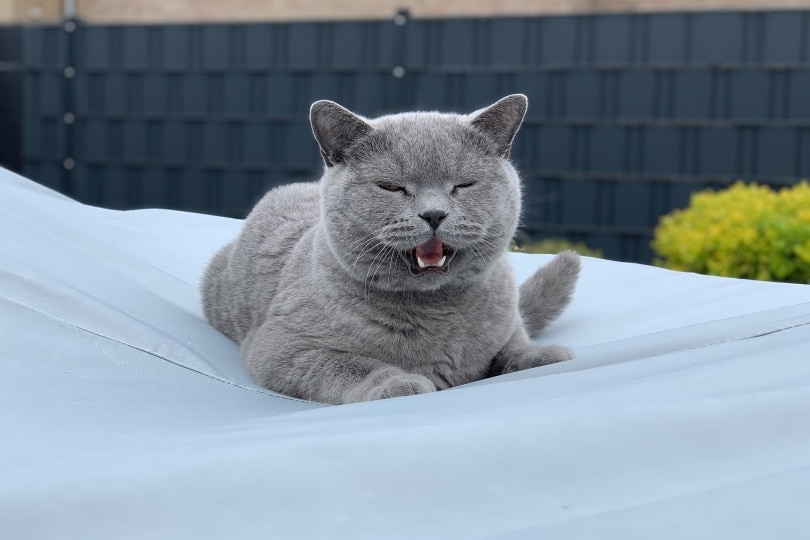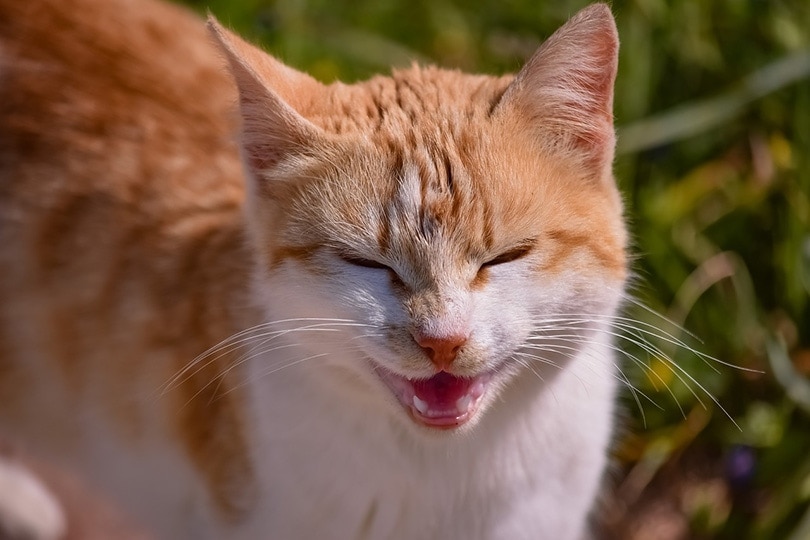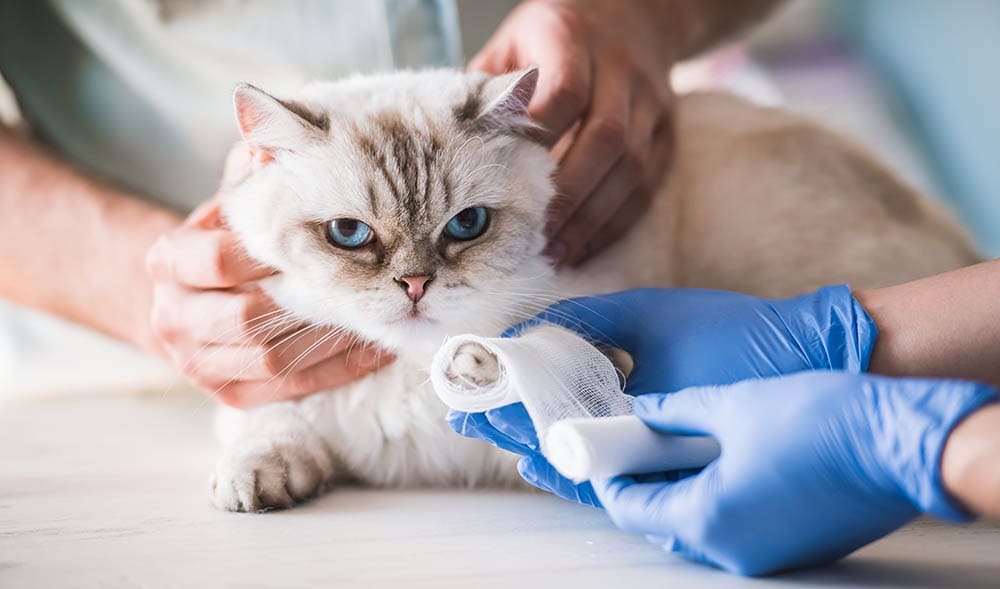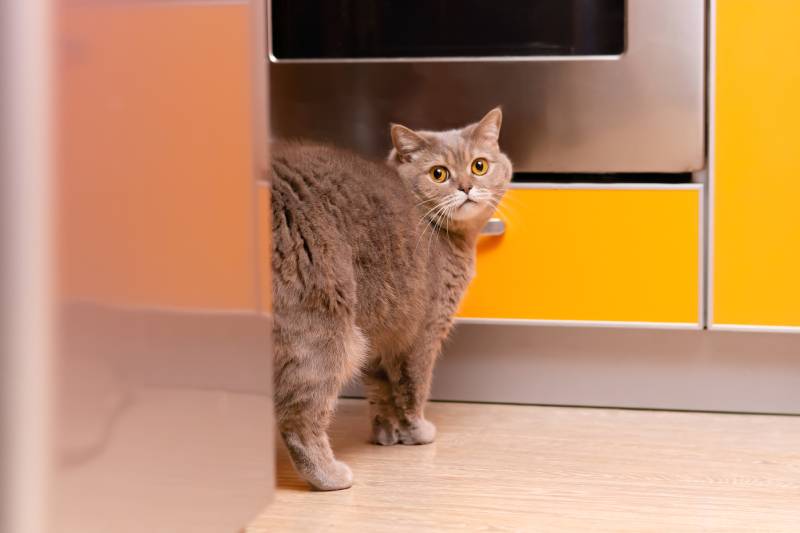Caterwauling: Vet-Reviewed Facts & FAQ

Updated on

They might not be able to talk, but cats have a plethora of ways in which they can communicate. Caterwauling is one such way. Caterwauling is a shrill, howling noise a cat may make for a number of reasons. It can be incredibly disturbing when you hear it, and once you have heard it, you know what the noise is.
Causes Of Caterwauling
Cats are very expressive animals and while they can’t mimic human speech, they do find ways to communicate with you. If you’ve had your cat for some time, you probably know when they are hungry or when they are going to want to use the litter tray. They might scratch to be let out and even knock to be let back in. Caterwauling is just another way to draw your attention to something.
- Hormones/Wanting to Mate – Cats communicate with one another all the time, even if that communication is to tell another cat to stay away. They also communicate their desire to mate, and a feline mating call can come across as caterwauling. One may caterwaul to another to express their desire, while the other cat might caterwaul as a positive or negative response.
- Pain – If your cat suddenly starts making this howling noise, there may be a chance that they are experiencing some kind of physical pain. Look for obvious signs, but don’t rule out the possibility that there is an underlying issue that is leading to the noise. For example, if your cat beings yowling or caterwauling while they use the litterbox, they might be struggling to urinate. If your cat recently went missing or fell down, they might be limping and caterwauling because of the pain due to the incident. If you ever suspect your cat is in pain, you should promptly schedule an appointment with your veterinarian.
- Anxiety/Stress – Cats are susceptible to changes in their environment, as well as changes to their daily habits. Something as seemingly innocuous as a new piece of furniture could be quite stressful to your cat, especially if they were attached to the old sofa. Separation anxiety could also manifest as a loud howling noise, while some cats are moved to meow if their litter tray is too dirty. The introduction of a new pet to the house might also cause a sensitive cat to develop high levels of anxiety and resort to caterwauling.
- Attention Seeking – Cats who love attention and can get quite upset if they aren’t getting what they believe to be a suitable amount of attention. Loud noises could be your cat’s way of getting your attention away from the TV and on them. They could be letting you know they’re hungry and out of food or simply that they have managed to use the litter tray, even if they have been doing so successfully for years.At other times, they might just want some affection from you. This sort of caterwauling can increase if they notice you respond frequently to it. Your cat might quickly learn that caterwauling is a sure fire way to get your attention whenever they need it. In such cases, you might need a cat trainer of behaviorist to assist you with any noise issues you’re facing.
- Greeting/Being Cats – At times, your cat might simply decide to caterwaul as a way of saying hello to you. If your cat is extremely fond of you, he or she may let out a loud howl when you finally return home after a long day. In such a case, your cat might be just portraying affection and being their loveable, goofy cat-self. This behavior can sometimes be inadvertently reinforced by owners who respond to the caterwauling. Your cat might quickly learn that them caterwauling leads to a response from you, and they may soon do it whenever they feel like grabbing your attention.

How to Prevent Caterwauling
Caterwauling is a means of communication, so you should expect some occasional caterwauling from your cat when it is done for your attention. Caterwauling may be lessened or stopped depending on how well you can manage the reasons leading to your cat eliciting the sound.
- See a Vet – If you believe that your cat’s yowling is being caused by some physical pain, take your cat to your vet for an examination. Pain is almost always a sign of an underlying issue, and it can be caused by many factors. Some sources of pain can be easily identified by owners, but others may need a professional look. Regardless of how easy or difficult it is to spot the source of pain, your cat would need veterinary attention.
- Neutering – If your cat is caterwauling because he or she is looking for a mate, having them neutered could stop the noise as well as the unwanted advances. It is important to note that caterwauling as a result of a desire to mate doesn’t immediately stop once you neuter your cat. Lingering hormones mean your cat may continue to caterwaul for up to a few weeks after their procedure. Contact your vet if your cat continues to consistently caterwaul 5-6 weeks after their neuter procedure.
- Cat Training – If your cat has learned that caterwauling seems to always get your attention, it might get to a point where constantly feeding into your cat’s calls reinforces the behavior. In such a case, you might need the assistance of a cat behavior specialist/trainer and/or your vet to find ways to have your cat learn other ways of communicating with you.
- Address Anxieties and Stressors – If your cat caterwauls from anxiety or stress, you would once again need to take your cat for a thorough checkup from your veterinarian to discuss ways in which you can address potential stressors. If you have videos of your cat (CCTV footage or recordings), they can be a great tool for your vet to see how your cat behaves at home. Your vet will offer treatment and management recommendations depending on the extent of your cat’s anxiety.
A Note About Female Cats
It is important to note that female cats normally caterwaul not just in heat, but during kitten birth too. If you have a pregnant cat at home, caterwauling might signal that her labor is about to start. She may also pace around and caterwaul between the delivery of each kitten during her labor. Such behavior is normal as kittens are being born, but shouldn’t last too long. Keep a close eye on your cat during labor, and if you think she is experiencing any difficulty with regards to delivering her kittens, take her to a vet.
Final Thoughts
Cats have a repertoire of noises and other means of communication, and caterwauling is one of them. Caterwauling can be an alarming noise, but is usually explainable if you pay close attention to your cat. Depending on the cause, your cat might need a trip to the vet to determine its cause and corresponding treatment or management.
Some cats may caterwaul as a learned behavior. If such cases of caterwauling are too excessive, you might need to get professional help to retrain your cat. Rest assured that your cat’s love for you won’t change as a result of such training, and your love for them shouldn’t stop you from seeking the help you need to control their yowls.
See Also:
Featured Image Credit: Marvin Otto, Pixabay













